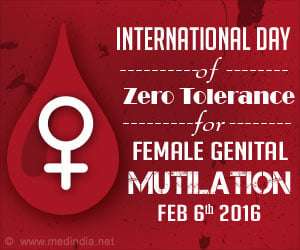Most men, women, boys and girls in countries where female genital mutilation (FGM) is common say they want the practice to end.

‘Two-thirds of people in Africa, the Middle East and Asia, where female genital mutilation is common oppose the practice and want it stopped. UNICEF estimates that at least 200 million girls and women alive today in 30 countries around the world have undergone female genital mutilation.’





“Although female genital mutilation is associated with gender discrimination, our findings show that the majority of boys and men are actually against it,” said Francesca Moneti, UNICEF Senior Child Protection Specialist. “Unfortunately, individuals’ desire to end female genital mutilation is often hidden, and many women and men still believe the practice is needed in order for them to be accepted in their communities,” she added.Some countries, men oppose female genital mutilation more strongly than women. In Guinea, which has the second-highest prevalence of female genital mutilation in the world, 38% of men and boys are against the continuation of the practice, compared with 21% of women and girls. The same pattern is seen in Sierra Leone, where 40% of boys and men want the practice to end, compared with 23% of girls and women, according to the data.
The findings also show that in just over half the 15 countries with available data, at least 1 in 3 girls and women say FGM has no benefits. The proportion is very similar among boys and men in all but two of the 12 countries with data.
According to UNICEF, in 2015 both Gambia and Nigeria adopted national legislation criminalizing the practice. In the 16 countries where data exist, more than 1,900 communities, covering an estimated population of 5 million people, have made public declarations to abandon female genital mutilation.
UNICEF’s research also reveals a possible link between a mother’s education and the likelihood that her daughter will be cut. Among 28 countries with available data, approximately one in five daughters of women with no education has undergone female genital mutilation, compared with one in nine daughters with mothers that have at least a secondary education.
Advertisement
UNICEF along with the UN Population Fund (UNFPA), co-lead the largest global programme to encourage elimination of FGM and currently support efforts in 17 countries. There is evidence of growing momentum and commitment to end the practice. However, deeply entrenched traditions in some communities in this region, and across the world, make this a major challenge. The Sustainable Development Goals (SDGs) adopted by the UN General Assembly in September 2015 include a target calling for the elimination of all harmful practices, such as female genital mutilation and child marriage, by 2030.
Advertisement








